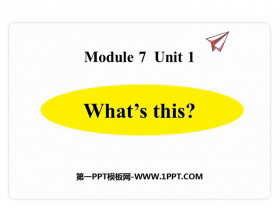

《Language in use》Life in the future PPT课件2
Revision
— How soon will you be back?
— In a month.
They want to travel by air.
Tom was able to ride a bike when he was five.
They aren’t children any more.
Language practice
Every family will have a small plane.
Teachers won’t use chalk on a blackboard.
What will life be like in the future?
Will schools be different in the future?
Yes, they will.
... ... ...
Complete the questions about the future.
例:Will students go (go) to school in the future?
1. __________ (use) pens and paper?
2. __________ (read) books?
3. __________ (travel) by small planes?
4. __________ (send) emails to teachers?
Work in pairs.
Ask and answer the questions in Activity 1.
— Will students go to school in the future?
— Yes, they will. / No, they won’t. They’ll study at home.
— Will students use pens and papers in the future?
— Yes, they will. / No, they won’t.
— Will you travel by small planes in the future?
— Yes, they will. / No, they won’t.
— …
... ... ...
Put the words in brackets in the correct place in the sentences.
先看例句:
They’ll have a lot of time! (free)
They’ll have a lot of free time!
1. People won’t have any jobs. (difficult)
People won’t have any difficult jobs.
2. Robots will do work on farms. (heavy)
Robots will do heavy work on farms.
3. People will have holidays. (long)
People will have long holidays.
4. There will be rain this evening. (light)
There will be light rain this evening.
... ... ...
Around the world
Japan has many robots now and you can see lots of them in the country. You can find worker robots, robots that clean your home, and even robots you can play with.
Work in groups of four. Talk about your ideas. Decide on five good ideas.
A: What will schools be like in the future?
B: The teacher won’t write on a blackboard ...
C: How will our homes change?
D: There will be more machines ...
... ... ...
一般将来时
如果我们想描述将来的事情或表达对未来的预测等,我们可以用一般将来时表达,它的动词形式是:“will + 动词原形”。例如:
There will be a computer on every desk in the future. 未来每个桌子上都将有一台电脑。
It will rain tomorrow. 明天将要下雨。
We will go to school on foot.
我们将步行去上学。
一般将来时的否定形式
一般将来时的否定形式,是在 will 后面加 not 或用 won’t。例如:
There will not be a computer on every desk in the future.
= There won’t be a computer on every desk in the future.未来每个桌子上都将没有一台电脑。
一般将来时的否定形式
It will not rain tomorrow.
It won’t rain tomorrow.
明天将不会下雨。
We will not go to school by bus.
We won’t go to school by bus.
我们将不乘公交车去上学。
... ... ...
一、选择题。
( )1. ______ you ______ free next Sunday?
A. Will; are B. Will; be
C. Do; be D. Are; be
( ) 2. There ________ a meeting tomorrow afternoon.
A. will be going to B. will going to be
C. is going to be D. will go to be
( ) 3. Charlie ________ here next month.
A. isn’t working B. doesn’t working
C. isn’t going to working
D. won’t work
( ) 4. He ________ very busy this week, he ________ free next week.
A. will be; is B. is; is
C. will be; will be D. is; will be
( ) 5. There ________ a dolphin show in the zoo tomorrow evening.
A. was B. is going to have
C. will have D. is going to be
... ... ...
二、动词填空。
— How long _____ you _____(study) in our country?
— I _____ (plan) to be here for about one more year.
— What ______ you ______ (do)after you ______ (leave) here?
— I _______ (return) home and ______ (get) a job.
Make a poster
Life in the future
Life in the future will be very different. We’ll ...
关键词:《Language in use》教学课件,外研版七年级下册英语课件,七年级英语幻灯片课件下载,《Language in use》PPT课件下载,.ppt格式












